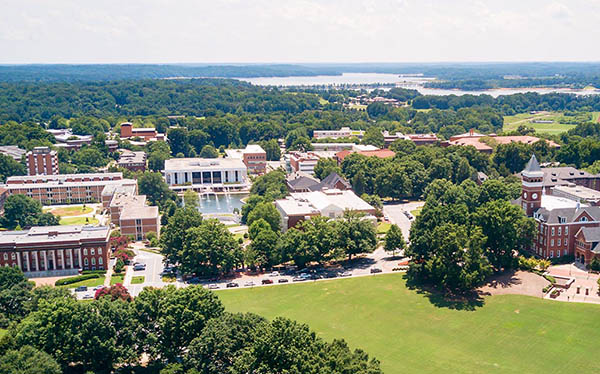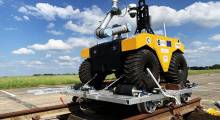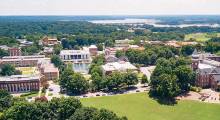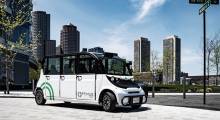Self-driving shuttle buses are a potential solution to transit challenges such as emissions and traffic congestion. Because they typically operate in more constrained routes than passenger cars or trucks, shuttles can provide autonomous services more immediately than other autonomous vehicles still in development. Optimus Ride Inc. today said it and its partners have obtained a grant of up to $4.3 million from the U.S. Department of Energy that will enable one of the largest deployments of autonomous shuttles in the U.S. over a three-year period.
Optimus Ride is collaborating with Clemson University, the University of California, Berkeley, and Argonne National Laboratory to provide mobility services for students, faculty, staff, and visitors at Clemson and conduct research on the interplay of sustainability, rider behavior, and autonomous vehicles (AVs).
Transportation accounts for about 30% of total U.S. energy needs and generates the largest share of the country’s greenhouse gas emissions. The deployment is part of the Department of Energy's (DOE) $60 million effort to fund 24 research and development projects to decarbonize the transportation sector and reduce carbon dioxide emissions from passenger cars and light- and heavy-duty trucks, which account for nearly 60% of emissions, and medium- and heavy-duty trucks, which account for nearly 25%.
The Biden-Harris admistration has set a goal of a net-zero emissions economy by 2050. Optimus Ride said it “is the sole AV company selected by the DOE to unite national energy initiatives, academic research, and measured advancement of AV technology.”
Research partners
The researchers from Clemson University, led by Dr. Ardalan Vahidi and Dr. Yunyi Jia, will measure the energy benefits of electric autonomous shuttles using historical baseline energy consumption and emissions data from Clemson’s traditional shuttles. The team will also study sustainability gains to be derived from AV technology’s routing, dispatch, and route optimization.
“I am excited to see the long term impact of Optimus Ride’s autonomous, electric shuttles on campus energy use, transportation choices, and parking behavior,” said Vahidi. “What we learn can easily translate to other university campuses and energy savings can scale up in larger metropolitan areas.”
“Instead of stressing about parking at peak hours, wasting time and energy, and perhaps missing a lecture, students, faculty, and staff can enjoy hassle free parking at satellite parking lots, thanks to the autonomous shuttles that show up predictably and frequently to chauffeur them around campus,” he said. “Many will choose to use the new system instead of driving their cars, to reduce their transportation carbon footprint.”
Argonne National Laboratory will model the sustainability and efficiency potential of AVs at scale, informed by the results from the research at the Clemson campus in South Carolina.
The researchers at UC Berkeley will focus on behavioral change and how riders shift transportation modes to better understand how to encourage people to consider more environmentally friendly forms of transportation than driving.
“The Transportation Sustainability Research Center is excited to partner with Clemson University and Optimus Ride to understand the potential benefits of autonomous shuttles in a campus environment,” said Dr. Susan Shaheen, director of innovative mobility research at UC Berkeley. “This project provides a unique opportunity to study the role of user incentives and multiple use cases, and their impacts on behavior change.”

Campuses as 'ideal' testbeds
Campus transportation teams across the U.S. strive to ensure that students, employees, and visitors have safe, convenient modes of transit. At the same time, such teams face reduced budgets and increasing sustainability and efficiency goals. Shared, electric, autonomous shuttles will allow for meaningful rides to be delivered while conducting valuable research at the same time, said Optimus Ride.
“College campuses offer a unique opportunity to reduce the environmental impact of transportation and increase the widespread adoption of autonomous vehicles,” said Sean Harrington, CEO of Optimus Ride. “Our vehicles have proven to be more energy efficient than traditional, human-driven, fossil-fueled shuttles, and we’re excited to verify and deliver the many benefits AVs have to offer to campuses like Clemson’s and beyond.”
Clemson’s 1,400 acre campus welcomes more than 25,000 students annually, making it an optimal testing environment to study the real-life situations, use cases, and passenger behavior that are hard to replicate on a test track, said the company. The university will benefit from convenient and efficient transportation with the goal of becoming the model for other campuses and master planned communities to pursue autonomous vehicle adoption.
“College campuses such as Clemson are ideal environments to significantly further AV research and adoption while providing a new and convenient transportation option to students and faculty alike,'' said Karim Al-Khafaji, head of business development at Optimus Ride and principal investigator for this project.
Optimus Ride to deploy 10 shuttles
Optimus Ride said it will contribute its “end-to-end mobility solution covering the provisioning of the fleet, our fully-integrated AV tech stack, a holistic rider experience, and full-service operations and support.” The Cambridge, Mass.-based company last week announced a strategic advisory board around autonomous transportation.
Up to 10 Optimus Ride shuttles will be deployed at Clemson University with the goal of studying a number of different research areas related to sustainability and low-speed, electric AVs. These include analyzing rider behavior and adoption and examining the effects of autonomous vehicles when deployed on a single campus and at scale.
Optimus Ride said it plans to analyze its routes, vehicle performance, sustainability benchmarks, and other data to continue to refine its shuttle service and its AV technology.
Article topics
Email Sign Up

















